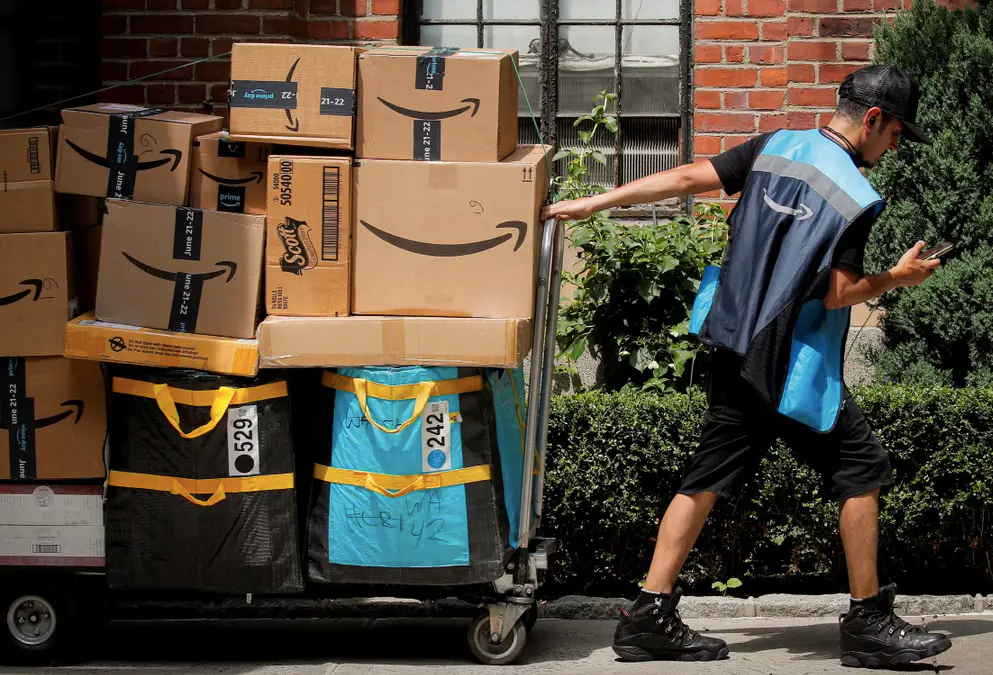|
Getting your Trinity Audio player ready...
|
FTC Sues Amazon – In a significant move against one of the world’s largest e-commerce companies, the Federal Trade Commission (FTC) filed a lawsuit against Amazon on Wednesday. The suit accuses the company of unlawfully enticing consumers into signing up for its Prime service and then impeding their efforts to cancel the subscription. The action taken by the FTC, under the leadership of Chair Lina Khan, represents the most aggressive stance against Amazon to date.
The lawsuit claims that Amazon employed “manipulative, coercive, or deceptive” design strategies, commonly referred to as “dark patterns,” on its website to dupe millions of consumers into enrolling in Prime without their informed consent. Furthermore, when consumers attempted to cancel their subscriptions, Amazon deliberately complicated the process with intricate and convoluted procedures. The FTC argues that Amazon’s actions not only frustrated users but also resulted in significant financial losses for consumers.
Amazon tricked and trapped people into recurring subscriptions without their consent, not only frustrating users but also costing them significant money.
FTC – Chair Lina Khan- ADVERTISEMENT -
The lawsuit, filed in the U.S. District Court for the Western District of Washington, targets a pivotal Amazon program that has become an integral part of the lives of over 200 million customers. Prime members pay an annual fee of $139, granting them access to faster shipping, streaming services, discounts at Whole Foods, and additional perks.
This legal action marks the first time that Chair Lina Khan has taken Amazon to court since assuming her position. Khan, known for her viral critique of Amazon’s practices, has been vocal about the need for regulators to adopt a more aggressive approach to addressing the influence of big tech companies. She has also pursued actions against other industry giants, such as Facebook’s parent company Meta, and Microsoft’s acquisition of Activision Blizzard.

However, critics of Amazon are eager to see if Khan will bring forth a comprehensive antitrust case against the company, as they have long demanded. The FTC’s antitrust bureau has been investigating Amazon’s practices for several years, and stakeholders on both sides are closely monitoring Khan’s approach based on these findings.
Amazon issued a statement denying the allegations made by the FTC, asserting that the claims are false both in terms of facts and legal interpretations. The company maintains that it clearly and simply facilitates both the sign-up and cancellation processes for Prime membership. Amazon also criticized the FTC for filing the lawsuit without prior notice, claiming that the two parties were still engaged in discussions regarding the case.
The lawsuit against Amazon is part of a broader regulatory effort to curb the power of tech giants such as Amazon, Apple, Google, Microsoft, and Meta. The Department of Justice has filed multiple antitrust cases against Google, and European regulators have also scrutinized and taken action against prominent tech companies. The goal is to establish stricter regulations, including privacy laws and proposals to rein in artificial intelligence.
For Amazon, Prime has been a cornerstone of its business, attracting millions of subscribers with its array of benefits and contributing to the company’s dominance in the market. The service, introduced in 2005 at $79 per year, has gradually expanded its offerings, raising the annual fee to $139 in 2022. Amazon reported over 200 million Prime members in 2021, with customers spending $35 billion on Amazon subscriptions, primarily Prime memberships.
The FTC’s allegations focus on Amazon’s deliberate efforts to make it challenging for customers to purchase products without simultaneously subscribing to Prime. The agency claims that Amazon used design elements such as repetition and color to direct customers’ attention to the promise of free shipping while diverting it from the price of the service. The FTC also argues that Amazon deliberately made it difficult for consumers to find the cancellation page and bombarded them with offers to
change their minds once they located the cancellation page. Interestingly, the lawsuit highlights that Amazon named the Prime cancellation process after the Iliad, the lengthy Greek epic poem recounting the Trojan War, further suggesting the company’s intent to hinder subscribers from canceling.
The FTC alleges that Amazon recently made some modifications to the Prime cancellation process, which the complaint, heavily redacted, acknowledges. However, before these changes, the primary purpose of the process was not to facilitate cancellations but rather to obstruct them, according to the lawsuit.
As a remedy, the FTC is seeking an injunction to stop Amazon from engaging in these alleged deceptive practices and is also calling for the company to pay an unspecified financial penalty. The outcome of this lawsuit will undoubtedly have significant implications for Amazon and could potentially reshape the landscape of consumer protection and online commerce.
This legal action against Amazon comes on the heels of recent settlements between the company and the FTC regarding previous cases. Last month, Amazon agreed to pay $25 million to settle allegations that its Alexa home assistant devices had illegally collected children’s data. The company also reached a settlement with the FTC over privacy concerns related to its Ring home security subsidiary.
The FTC’s pursuit of legal action against Amazon reflects a broader trend of increased scrutiny and regulation of tech giants. Authorities worldwide are grappling with the immense power wielded by these companies and are actively taking steps to address potential antitrust and consumer protection issues.
Chair Lina Khan’s involvement in these cases against industry leaders like Amazon, Meta, and Microsoft demonstrates her commitment to robust enforcement and rethinking antitrust laws in the digital age. Khan rose to prominence through her influential article, “Amazon’s Antitrust Paradox,” which advocated for a broader interpretation of antitrust laws to tackle the dominance of tech companies.
The outcome of the lawsuit against Amazon will have far-reaching implications not only for the company but also for the broader tech industry. It will provide insight into Chair Lina Khan’s approach and set a precedent for future actions against other tech giants.
As the legal battle unfolds, regulators and stakeholders will closely monitor the proceedings to see how Amazon’s alleged deceptive practices are addressed and whether this will prompt more significant changes in the way tech companies conduct business. The FTC’s move sends a clear message that regulators are committed to ensuring fair competition and protecting consumer rights in the rapidly evolving digital landscape.
The lawsuit against Amazon serves as a wake-up call for other players in the industry, emphasizing the need for responsible and transparent business practices. Regulators are now more determined than ever to level the playing field and hold tech giants accountable for their actions.
The case also underscores the importance of consumer awareness and protection. It highlights the significance of reading terms and conditions thoroughly before subscribing to any service and being vigilant about cancellation processes. The FTC’s focus on deceptive design tactics, or “dark patterns,” should prompt companies to reassess their practices and ensure they are not engaging in similar tactics that mislead or confuse consumers.
Moreover, this legal battle raises questions about the broader role of antitrust laws in the digital era. As technology continues to shape various industries, including e-commerce, streaming services, and digital marketplaces, it is crucial to reevaluate existing regulations and adapt them to the evolving landscape. Chair Lina Khan’s perspective, as outlined in her influential article, challenges the traditional understanding of antitrust law and advocates for a more expansive approach to address the unique challenges posed by tech giants.
While this lawsuit is a significant step forward, it is just one piece of the puzzle in the larger effort to rein in the power of big tech companies. It will be crucial for regulatory bodies like the FTC to continue monitoring and investigating potential anticompetitive practices and taking appropriate action when necessary. The outcome of this case will likely set a precedent and shape the future regulatory landscape, impacting not only Amazon but also other tech giants facing similar scrutiny.
As the legal proceedings unfold, the eyes of consumers, industry experts, and policymakers will remain fixed on the outcome. The resolution of this case will send a powerful message about the importance of fair competition, consumer rights, and the responsibilities that come with immense market influence. It is a pivotal moment that will define the trajectory of regulatory actions against tech giants and shape the digital economy for years to come.
In conclusion, the FTC’s lawsuit against Amazon signifies a significant escalation in efforts to curtail deceptive practices and promote fair competition in the digital marketplace. With Chair Lina Khan leading the charge, the FTC is demonstrating its commitment to redefining antitrust norms and holding tech giants accountable.
The lawsuit raises critical questions about consumer protection, the influence of big tech companies, and the need for comprehensive regulation in the digital age. The outcome of this case will undoubtedly have profound implications for Amazon, its competitors, and the broader tech industry.



